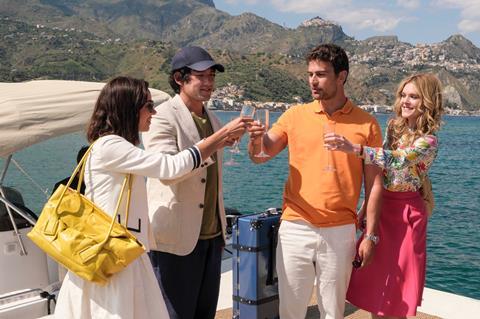
One of the biggest ‘stars’ to emerge from the second series of HBO’s The White Lotus was the Sicilian coastal town of Taormina, where the production filmed. With the Ionian Sea as a glittering backdrop, the drama put on abundant displays of exactly what Italy offers as a filming location and sparked an explosion of press about the joys of holidaying on the volcanic island.
Just as eye-catching in its own way was the impressive stand the Sicilia Film Commission took at the Majestic Hotel at Cannes Film Festival in 2022.
Attracting film and TV shoots to a region or country is bigger business than ever because the economic impact of a shoot and the knock-on tourism value can be huge.
Sicilia is just one of 19 regional organisations dotted around Italy working hard to put the country at the forefront of all the major locations conversations had by the US studios and steamers and the big international film and TV producers.
Attractive deals
Film commissions the world over tend to be funded by local government entities, often with a tourism component. What makes the Italian network stand out is that most also offer grants to local and international productions shooting in their region. Not only does this help attract incoming productions but it boosts the local production sector, and provides jobs and training opportunities for local professionals.
The funds total a combined $56.8m (€52m) a year, according to the Italian Film Commissions body. Indivdiuall they offer from a pot of $20.7m (€19m) a year (Rome-Lazio Film Commission) to $437,000 (€400,000) a year (Vallée d’Aoste Film Commission). They are popular with independent productions, from film and TV series to documentaries, short films and some VR projects.
Notably, they can all be easily combined with Italy’s national tax credit, which reimburses up to 40% of an eligible production’s tax bill. There is no ceiling for a single project, only to a single company which can receive up to €20m in one year, not exceeding 80% of the total budget.
Some film commissions also have dedicated development and production support. Most of the funding comes in the form of grants and the film commissions do not take recoupment positions in projects. Although eligible for the regional grants in theory, most of the bigger international productions to recently shoot in Italy have not applied for this regional funding, preferring to focus on the national tax credit. The amounts involved are too small for these multimillion-dollar productions when considered with the not insubstantial reporting and compliance commitments, sources say.
However, for smaller independent productions it can be a crucial part of the budget. Jessica Woodworth’s Rotterdam premiere Luka, a Belgium-Italy-Netherlands-Bulgaria co-production (in association with Armenia) shot in Sicily in 2021 and accessed funding from the Sicilia Film Commission.
Regional film commissions will help find creative co-producers, unearth unique locations and source local talent and crews. In many instances they also provide information and networking opportunities for industry professionals and help liaise with local film festivals, workshops and other events.
The amount of funding provided can vary depending on the project and the commission involved but, overall, the regional grants are a crucial factor in getting indie films made in Italy and can provide a vital piece of the international co-production puzzle. Most commissions will award funding on a points basis via a panel of industry experts who evaluate productions using criteria such as artistic merit, potential impact on the local industry and the amount of time shot in the region.
Over the following three pages, Screen International reports on what 15 of the most active of Italy’s film commissions offer international producers. (The Basilicata and the Abruzzo region film commissions are both undergoing significant restructures.) In such a competitive global locations sector and with budgets rising for independent producers around the world, the funding offered by Italy’s film commissions is more important than ever.
Apulia Film Commission

The film commission dispenses an annual pot of funding of around $10.9m (€10m) to attract shoots to Puglian landscapes, which frequently double for locations in the Middle East, Africa and the American West. Eligible productions must schedule at least 25% of the shoot in the region. There are no obligations to represent the region on screen. Productions to work with the commission include Beta and ZDF’s Berlinale Series opener The Swarm, Michael Winterbottom’s Shoshana (aka Promised Land), Marcus Stokes’ State Of Consciousnessand Jean Luc Herbulot’s Interstate.
Who to know: Antonio Parente, director general
Good to know: Angelina Jolie’s Without Blood for Fremantle shot in the region in 2022, using dozens of local crew members accessed through the commission. A five-month location scout with the commission resulted in production taking place in the town of Martina Franca and in the Masseria Accetta Grande country estate near Taranto.
Find out more: apuliafilmcommission.it
Calabria Film Commission
The Calabria region located in the southern ‘toe’ of the Italian peninsula is renowned for its diverse 800km coastline, hosting productions such as one series of Danny Boyle’s Trust for FX, Jonas Carpignano’s A Ciambra and Daniel Espinosa’s Madame Luna.
The commission administers an annual fund of between $5.5m and $7.6m (€5m and €7m) to film and TV productions. Features and TV drama series budgeted up to $3.3m (€3m) can receive up to $546,000 (€500,000) as long as this does not exceed 50% of total production costs. For documentaries the maximum is $54,500 (€50,000). There are minimum shooting days and spending requirements depending on the type of project. Features must spend at least the value of the grant in the region.
Who to know: Anton Giulio Grande, commissioner; Luciano Vigna, director
Good to know: The commission is spearheading plans to build the region’s first film studio facility in Lamezia Terme.
Find out more: calabriafilmcommission.it
Campania Film Commission
The southern region of Campania lies below Lazio and encompasses the city of Naples, the islands of Capri and Ischia, Mount Vesuvius, and the Roman ruins of Pompeii and
Herculaneum. Saverio Costanzo’s HBO series My Brilliant Friend, Paolo Sorrentino’s The Hand Of God for Netflix, Warner Bros’ Wonder Woman and Antoine Fuqua’s The Equalizer 3 for Sony have all shot in and around Campania in the past few years. All worked with the commission, which also runs the Piano Cinema development and production fund.
The Campania fund has an annual budget of $5.5m (€5m), of which half is granted to productions and half is invested in the promotion of local film and audiovisual culture, training local professionals and support for local cinemas. Grants to features are capped at $164,000 (€150,000) per production. Productions must shoot for at least six days in Campania. Features and TV series are required to spend the equivalent of 150% of the funds received in the region.
Separately, development grants are awarded only to Campania-based producers who own at least 50% of their project’s IP. They do not need to shoot in the region.
Who to know: Titta Fiore, president; Maurizio Gemma, director
Good to know: Campania works hard as a locations stand-in. “Many sites lend themselves to settings in other places,” says Gemma. “The Royal Palace of Caserta often doubles as the Vatican, and was also used for settings of the Star Wars saga, while the beaches of Cilento became part of the Wonder Woman world.”
Find out more: fcrc.it
Emilia-Romagna Film Commission
Lionsgate’s Lamborghini and Luca Guadagnino’s HBO series We Are Who We Are are among the high- profile productions to be attracted to this northeastern region.
As well as offering location support services, the regional film commission manages the Audiovisual Fund, which offers grants for everything from development, to production, through to exhibitor support. A single feature or television series can receive up to $164,000 (€150,000), with exceptions made for productions deemed particularly culturally relevant to
the region, for which the ceiling rises to $273,000 (€250,000) per project. In 2022, the fund awarded grants of $3.3m (€3m) in total.
The 2023 deadlines for funding applications are February 28 and July 31. To be eligible, productions must ensure at least 30% of total shooting days are carried out in the region and at least 30% of the total budget is spent in the region, or they must film 18 days or more in the region.
Who to know: Fabio Abagnato, director
Good to know: “It is a land of engines and ancient paths, medieval villages and technological districts, discos and museums, with the unique qualities of the river Po Delta,” says Abagnato.
Find out more: cinema.emiliaromagnacultura.it
Friuli Venezia Giulia Film Commission
This northeast region borders Austria to the north, Slovenia to the east, and the Adriatic Sea to the south, and is home to part of the Dolomites mountain range.
Set up in 2000, FVG was the first commission in Italy to roll out annual funding packages to assist productions over and above logistical support.
In 2022, it invested $1.8m (€1.6m) in 51 productions, including four Netflix projects — The Old Guard 2, Lift, The Witcher season three and The Union. Also last year, the commission was incorporated into the local regional tourism promotion body PromoTurismo FVG.
As of 2023, the commission will invest up to $328,000 (€300,000) in projects, based on the economic impact for the region, estimated via a points system.
Who to know: Gianluca Novel, film commissioner; Guido Cassano, film commissioner
Good to know: “Careful research has led us to build up a locations database made up of over 85,000 photos over the years,” says commission co-ordinator Chiara Valenti Omero.
Find out more: fvgfilmcommission.com
IDM Film Commission Südtirol
There are two film commissions in the mountainous Trentino Alto Adige region, covering separate provinces. IDM encompasses the South Tyrol province (also known as Alto Adige), home to myriad castles and a much-touted outdoor sports destination. The capital Bolzano is known for its vibrant traditional local cuisine and wine culture.
IDM supports film and TV projects with an annual fund of $4.9m (€4.5m), divided into production, pre-production and short film productions. ZDF and Beta’s six-part surveillance thriller Concordia, for which the showrunner is Frank Doegler, shot in the region last year.
Italian productions can access up to 50% of total production costs, while international co-productions with one or more EU partner can access up to 60% of the total cost. (‘Difficult audiovisual works’ are not subject to these limitations.)
Productions must have the bulk of the rest of the financing and a distribution agreement in place. The equivalent of at least 150% of requested funds must be spent in the area, and local professionals and service providers must be hired for the filming phase. Applications must be submitted prior to shooting starting.
Who to know: Birgit Oberkofler, head of film fund and commission
Good to know: The majority of the population speaks German and has a strong German cultural identity.
Find out more: film.idm-suedtirol.com
Marche Film Commission
This central region borders the Adriatic Sea to the east. It is known for its rolling hills, scenic beaches and historic cities, as well as its rich cultural heritage with influences from ancient civilisations and the Renaissance. Some of the most notable cities include regional capital Ancona, Pesaro, Urbino and Macerata.
Marie Kreutzer’s Bafta-nominated period feature Corsage was shot in the region, as was Mario Martone’s 19th-century drama about poet Giacomo Leopardi, The Fabulous Young Man.
The commission has $3.5m (€3.2m) to grant to productions in 2023, with an expected ceiling of $328,000 (€300,000) per feature.
Who to know: Francesco Gesualdi, director
Good to know: The Marche region has one of the lowest population densities in central and northern Italy, making it easier when it comes to requested permits and on-set coordination and security.
Find out more: filmcommissionmarche.it
Rome-Lazio Film Commission
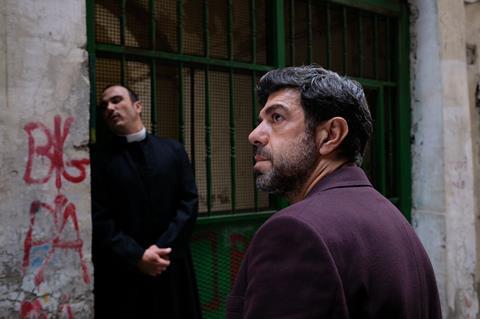
The Roma-Lazio Film Commission operates two production funds: the Regional Fund for Cinema and Audiovisual, with an annual budget of $9.8m (€9m), and the Lazio Cinema International Fund, geared towards international co-productions, with an annual budget of $10.9m (€10m).
The former grants awards on a percentage basis ranging from 13% to 15% of eligible costs. Productions applying for the international fund can receive up to $546,000 (€500,000), with funding available on 30% to 45% of eligible costs. Half of its funding is reserved for ‘audiovisual works of regional interest’, to which production companies based in Lazio can apply.
Some of Italy’s biggest directors have recently shot in the region: Marco Bellocchio with The Conversion, Saverio Costanzo’s Finally Dawn and Mario Martone’s Nostalgia.
Who to know: Cristina Priarone, director general
Good to know: Rome’s Cinecitta Studios received $284.3m (€260m) from the European Union’s post‑pandemic recovery funds, which it invested in the construction of an additional five studios to add to its existing 19.
In addition, eight more studios are planned on nearby land acquired by Cinecitta. Netflix’s Black Death-era drama series The Decameron recently started shooting at Cinecitta, while Roland Emmerich’s Roman gladiator series Those About To Die, featuring Anthony Hopkins, will go into production later this year.
Find out more: romalaziofilmcommission.it
Sicilia Film Commission
HBO’s The White Lotus and Paramount Pictures’ Indiana Jones And The Dial Of Destiny, starring Harrison Ford, are among the big international productions to shoot recently in Sicily. Jessica Woodworth’s Rotterdam sci-fi title Luka also shot in Sicily.
In 2022, the commission’s funding pot totalled $11.8m (€10.8m). Awards are made via an annual call, with a maximum of one awardee per category (feature films, TV series, documentaries and shorts).
Who to know: Nicola Tarantino, director
Good to know With the temperate climate offering up balmy weather nearly all year round, production days in Sicily start early and end late.
Find out more: siciliafilmcommission.org
Trentino Film Commission
Trentino Film Commission is the second in the Trentino Alto Adige region. Trento, the province in which it is situated, borders Austria and Switzerland, and encompasses parts of the Dolomites and the Alps. The city of Trento, the capital of the region, is home to Renaissance palaces with frescoed facades and Buonconsiglio Castle, famed for its frescoes and crenellated towers.
The commission has $2.2m (€2m) to spend annually on features and series that benefit the economy and promote the region’s environmental, cultural and historical heritage.
Fiction films and TV can apply for up to $437,000 (€400,000) and documentaries up to $44,000 (€40,000), both not exceeding 50% of the budget. Film and TV productions must have a total expenditure equivalent to at least 150% of the local funding and 20% of the crew must be local.
For documentaries, total expenditure must be equivalent to 120% of local spend and two crew members must come from the area.
There are three funding calls a year and this year applications will close on March 2, June 6 and September 21. Requests need to be made before the start of production.
Recent productions to shoot in the region include Japanese manga series Drops Of God and the ZDF/Beta spy thriller Concordia.
Who to know: Luca Ferrario, director
Good to know: “Trentino stands out for its focus on the environment. We were the first European fund to encourage sustainable production and have been doing this now through our Green Film certification system,” says Ferrario.
Find out more: trentinofilmcommission.it
Turin Piedmont Film Commission
Universal Pictures’ Fast X (Fast & Furious 10), directed by Louis Leterrier, wrapped 10 days of shooting in Piedmont in June 2022, with the capital Turin offering myriad open-air sets including local squares, streets and monuments.
The 500-strong crew included around 150 locals. The film commission was involved from the start, assisting from September 2021 on location surveys, permits, security co-ordination, police support, street viability and transport preparations.
With a total annual grant budget this year of $4.4m (€4m), the ceiling is $437,000 (€400,000) per project. The next funding call deadline is in March. Productions must shoot for at least 10 days in the region and applications are evaluated according to local crew, local services and accommodation expenditure.
Who to know: Paolo Manera, director
Good to know: “Fast X shows our region has all that is needed to host complex productions, skilled professionals, supportive institutions and amazing locations,” says Beatrice Borgia, president of Turin Piedmont Film Commission.
Find out more: fctp.it
Tuscany Film Commission
Tuscany Film Commission (TFC) prides itself on a tailored and rapid service for productions, which have included Alfonso Cuaron’s Disclaimer, Florian Baxmeyer’s One Trillion Dollars, and HBO’s Succession series. “Every request for information is processed within 24 hours,” says Stefania Ippoliti, TFC director. “We continue to follow the production through the shooting.”
It grants around $1.1m (€1m) annually to eligible productions shooting in the region.
Who to know: Stefania Ippoliti, director; Raffaella Conti, co-ordinator
Good to know: The towns of Prato, Pisa and Pistoia are renowned for their cluster of film equipment suppliers.
Find out more: toscanafilmcommission.it
Umbria Film Commission
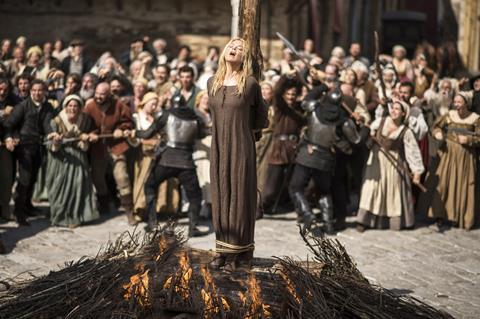
Paul Verhoeven shot a significant part of his 2021 film Benedetta in Umbria, the central region known for its history and culture dating back to the Roman Empire and the Etruscans. The production was based in the medieval town of Bevagna for two months before moving on to the area capital Perugia, where key scenes for Giacomo Battiato’s RAI series The Name Of The Rose also recently filmed. The commission’s Umbria Film Fund grants $1.4m (€1.3m) annually to features shooting in the region through a cash rebate of 50% on local expenditure up to $874,000 (€800,000). The maximum for each production is $437,000 (€400,000).
Who to know: Paolo Genovese, president
Good to know: Umbria has several production facilities and soundstages and is planning the relaunch of Papigno Studios in Terni. This is where Roberto Benigni filmed Life Is Beautiful in 1997.
Find out more: umbriafilmcommission.com
Vallée d’Aoste Film Commission
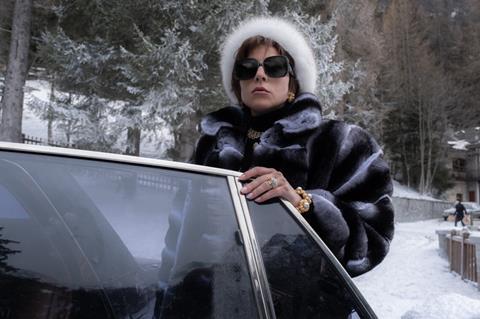
Italy’s smallest region is the north-west Aosta Valley, which boasts a natural beauty that includes glaciers, alpine valleys and hot springs. Its snow-covered slopes have recently provided backdrops to major international films, including Disney/Marvel’s Avengers — Age Of Ultron, Ridley Scott’s House Of Gucci, and Felix Van Groeningen and Charlotte Vandermeersch’s Cannes 2022 Competition title Eight Mountains.
The commission has a $437,000 (€400,000) fund for 2023 and can grant up to $87,500 (€80,000) to a production, provided expenditure in the area is not less than 150% of the grant total. In cases deemed to be works of exceptional artistic and economic value, the ceiling may be raised to $196,500 (€180,000).
Productions are evaluated on the basis of reputation of filmmaking team, cultural and artistic value of the project, and the relevance to the area. While there is no minimum number of local workers or shooting days, the production must partially shoot in Aosta Valley. Additional points are given to production companies with a local presence, and bilingual works reflecting the Italian-French culture of the area. Directorial debuts, second films and also documentaries are viewed favourably.
Who to know: Simone Gandolfo, president
Good to know: Productions have free access to more than 75 castles, many still furnished.
Find out more: filmcommission.vda.it
Veneto Film Commission
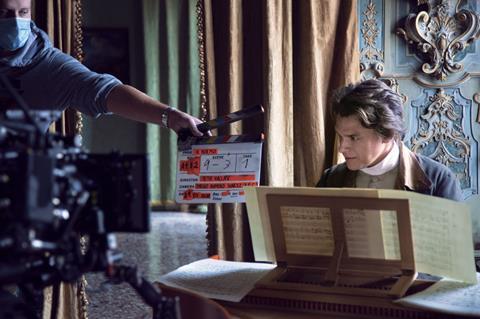
Italy’s newest commission was founded in 2020 with a staff of just six. It offers funding for location scouting and grants for production over and above working to facilitate local film and TV shoots. Kenneth Branagh’s A Haunting In Venice, Denis Villeneuve’s Dune 2, Michaela Taschek’s Snow and Petr Vaclav’s Il Boemo all made use of its services recently.
The production fund grants $4.4m (€4m) a year in two calls. Features and TV series are awarded a maximum of $328,000 (€300,000), provided they spend at least 30% locally. Documentaries, shorts and XR content can receive up to $54,500 (€50,000) per work if they spend 60% locally. A points system looks at screenplay quality, production company and proposal solidity, the director’s and team’s credits, and promotional benefits for the region.
Who to know: Jacopo Chessa, CEO
Good to know: “Productions can find skilled local professionals very easily, and at the end of the shooting day it is always wonderful to enjoy cicchetti over a spritz or prosecco,” says Chessa.
Find out more: venetofilmcommission.com






![The Brightest SunScreen[Courtesy HKIFF]](https://d1nslcd7m2225b.cloudfront.net/Pictures/274x183/3/5/0/1448350_thebrightestsunscreencourtesyhkiff_312678.jpg)


















No comments yet